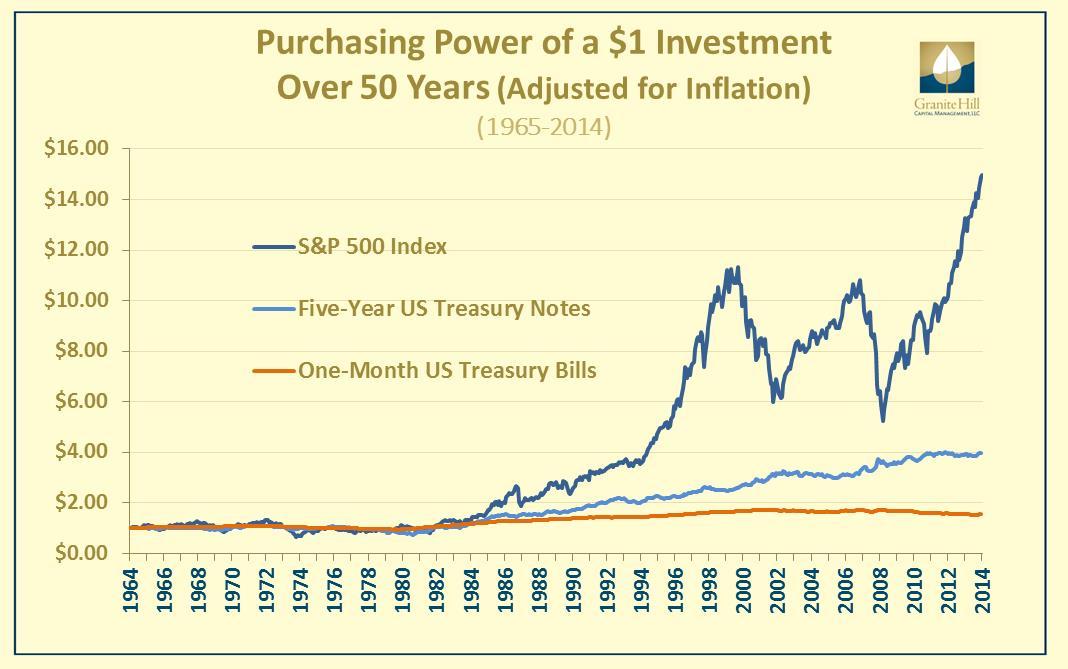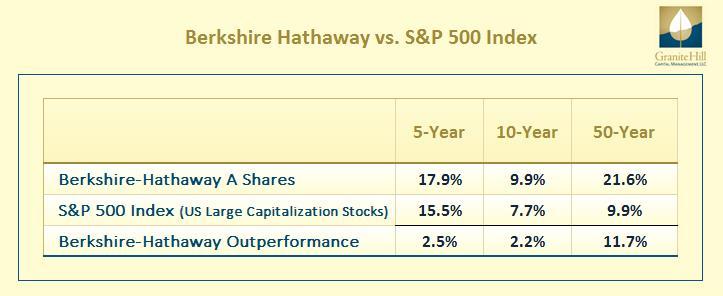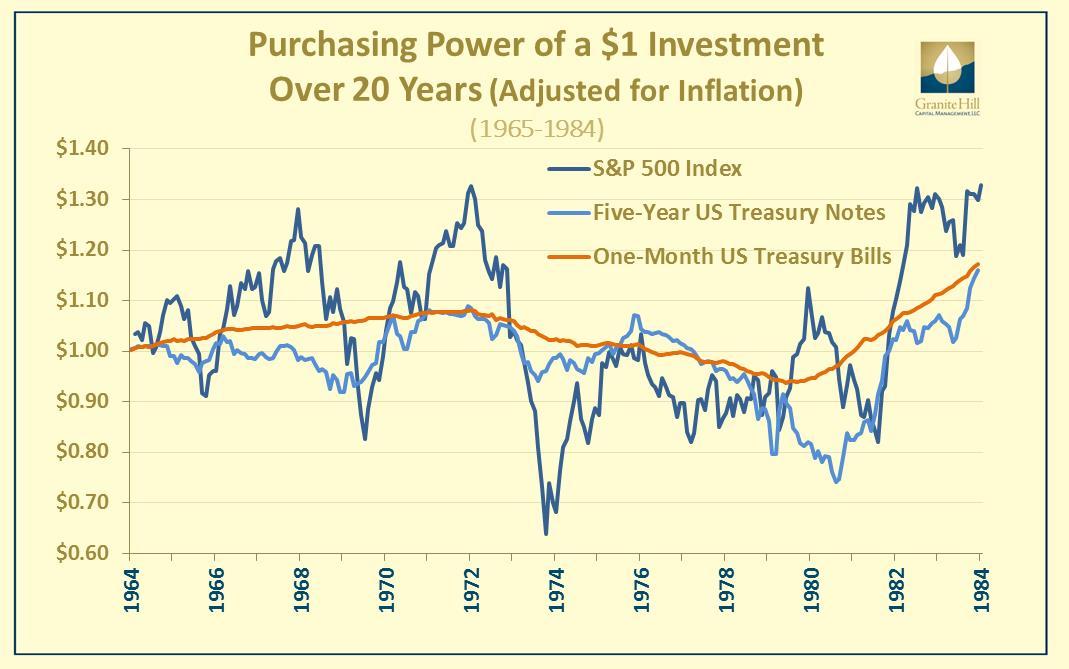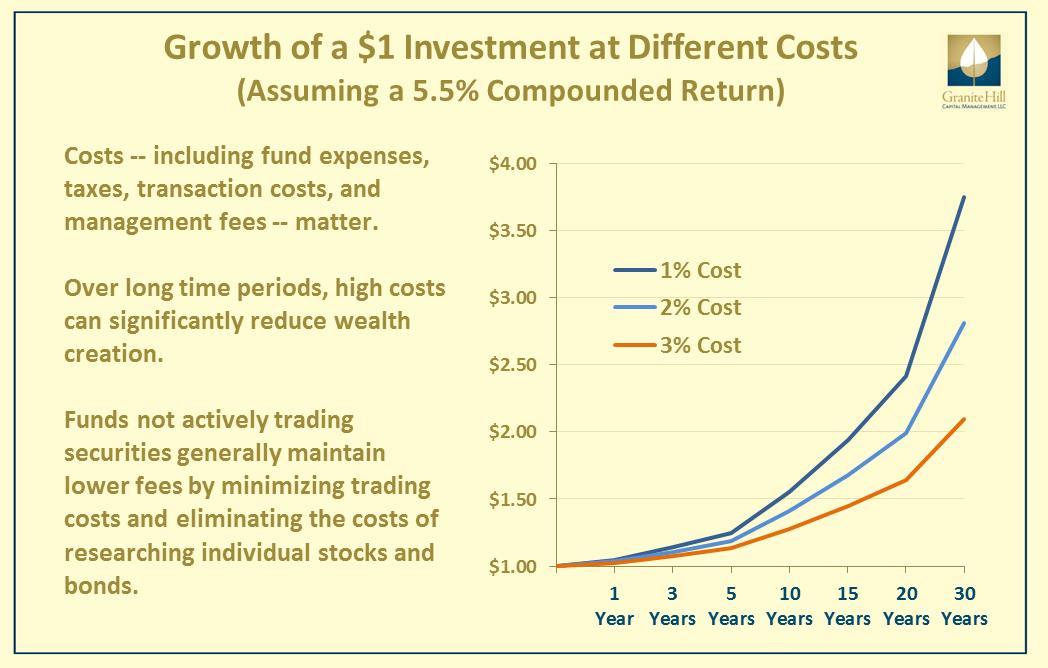Warren Buffett’s annual Berkshire Hathaway shareholder letter provides insight into investment strategy worthy of consideration by all investors. This year’s letter, celebrating the 50th anniversary of Berkshire Hathaway under Mr. Buffett’s management, is no different. The following six insights may prove especially valuable to the individual/independent investor.
1. Stocks offer better long-term inflation protection than interest-bearing securities.
“The unconventional, but inescapable, conclusion to be drawn from the past fifty years is that it has been far safer to invest in a diversified collection of American businesses than to invest in securities – Treasuries, for example – whose values have been tied to American currency. … Stock prices will always be far more volatile than cash-equivalent holdings. Over the long term, however, currency-denominated instruments are riskier investments – far riskier investments – than widely-diversified stock portfolios that are bought over time.”
 Indexes are not available for direct investment but reveal positive and negative performance over time. Dividends and interest are reinvested but taxes are not considered. Their performance does not reflect the expenses associated with the management of an actual portfolio. Sources: DFA Returns program.
Indexes are not available for direct investment but reveal positive and negative performance over time. Dividends and interest are reinvested but taxes are not considered. Their performance does not reflect the expenses associated with the management of an actual portfolio. Sources: DFA Returns program.
Caveat: While the graph above illustrates Mr. Buffett’s point in spades over a 50 year period, it is important to note that stocks can undergo long periods of poor and unsettling performance when adjusted for inflation. The graph below, which isolates only the first 20 years of this block, illustrates that stocks performed poorly relative to interest-bearing securities over extended periods and were far riskier. Particularly for those in, or nearing, retirement, such sharp ups and downs can be quite unnerving and may warrant a dose of safer interest-bearing securities (e.g., bonds or shorter maturity instruments and CDs) sufficient to ride out any storms.
2. Ignore market forecasters.
“And no advisor, economist, or TV commentator – and definitely not Charlie nor I – can tell you when chaos will occur. Market forecasters will fill your ear but will never fill your wallet.” [“Charlie” refers to Charlie Munger, the Vice Chairman of Berkshire Hathaway.] Likewise, “sitting tight is seldom recommended by Wall Street. (Don’t ask the barber whether you need a haircut.)”
While humans strive to perform well and far exceed the average, separating the truly skillful investor from one who has merely been lucky takes time. It is wise to avoid adhering strictly to the guidance of an expert who suggests he or she can consistently navigate the markets on the basis of forecasts.
3. Hold safe securities for turbulence and near-term spending.
“Cash, though, is to a business as oxygen is to an individual: never thought about when it is present, the only thing in mind when it is absent.” …. “And by that we mean U.S. Treasury bills, not other substitutes for cash that are claimed to deliver liquidity and actually do so, except when it is truly needed. When bills come due, only cash is legal tender. Don’t leave home without it.”
This is the “safety first” mentality, which merits strong consideration by retirees and those facing significant spending. In other words: don’t gamble tuition money, down payments for a house, and other serious investment savings on the stock market.
4. Keep costs low.
“Huge institutional investors, viewed as a group, have long underperformed the unsophisticated index-fund investor who simply sits tight for decades. A major reason has been fees: Many institutions pay substantial sums to consultants who, in turn, recommend high-fee managers.”
Though institutions are singled out in this piece of advice, the warning certainly also applies to individual investors. The graph below illustrates the drag on performance of costs over time.
5. Establish discipline and utilize sound principles.
“Investors, of course, can, by their own behavior, make stock ownership highly risky. And many do. Active trading, attempts to “time” market movements, inadequate diversification can destroy the decent returns that a life-long owner of equities would otherwise enjoy.”
Whether intentional or borne out of fear during periods of market turmoil, active trading can beckon. This, along with the belief that a few select investments can outperform, is exactly what Mr. Buffett recommends against.
Caveat: While Mr. Buffett believes a low-cost S&P 500 index fund provides sufficient diversification, we at Granite Hill Capital see significant merit in a globally diversified portfolio, as the evidence here supports:
- Performance Chasing: Don’t Trip on International Stock Funds
- International Stock Allocation: 0%, 20%, 50%, or None of the Above?
- Diversifying internationally: “Is it safe?”
6. Set reasonable expectations.
“The bad news is that Berkshire’s long-term gains – measured by percentages, not by dollars – cannot be dramatic and will not come close to those achieved in the past 50 years. The numbers have become too big. I think Berkshire will outperform the average American company, but our advantage, if any, won’t be great.”
 Indexes are not available for direct investment but reveal positive and negative performance over time. Dividends and interest are reinvested but taxes are not considered. Their performance does not reflect the expenses associated with the management of an actual portfolio. Sources: Berkshire Hathaway Shareholder Letter, 2014 and Morningstar.
Indexes are not available for direct investment but reveal positive and negative performance over time. Dividends and interest are reinvested but taxes are not considered. Their performance does not reflect the expenses associated with the management of an actual portfolio. Sources: Berkshire Hathaway Shareholder Letter, 2014 and Morningstar.
To be sure, Warren Buffett’s investing skill has been exceptional, as evidenced by an annualized rate of return of 21.6% versus the broader US large cap S&P index of 9.9% over the past 50 years. However it is useful to note that during the past five and ten year periods, this superior performance has been diminished. Given the billions of dollars of income and dividends that Berkshire has to deploy, acquisitions and stock purchases must be of very large companies – and it is smaller company bargains that drove the superb performance seen early on. As an individual investor, you have the advantage of purchasing funds comprised of companies much smaller in size.
Executing these insights.
While seemingly simple, Mr. Buffett’s insights are quite difficult to execute well. The media, Wall Street, and our own instinctual “fight or flight” wiring can combine to make the process difficult. A written investment plan that is built upon solid investing principles and considers your resources, goals and risk tolerance or need for stability can form a foundation for putting these critical insights into practice. If you’re unable to reach Mr. Buffett directly for additional wisdom and you would like to discuss your investment approach with a professional advisor at Granite Hill Capital, we would welcome your call or e-mail.
Image courtesy of Stuart Miles at FreeDigitalPhotos.net
This blog entry is distributed for educational purposes and should not be considered investment, financial, or tax advice. Investment decisions should be based on your personal financial situation. Statements of future expectations, estimates or projections, and other forward-looking statements are based on available information believed to be reliable, but the accuracy of such information cannot be guaranteed. These statements are based on assumptions that may involve known and unknown risks and uncertainties. Past performance is not indicative of future results and no representation is made that any stated results will be replicated. Indexes are not available for direct investment. Their performance does not reflect the expenses associated with the management of an actual portfolio.
Links to third-party websites are provided as a convenience and do not imply an affiliation, endorsement, approval, verification or monitoring by Granite Hill Capital Management, LLC of any information contained therein. The terms, conditions and privacy policy of linked third-party sites may differ from those of this website.





